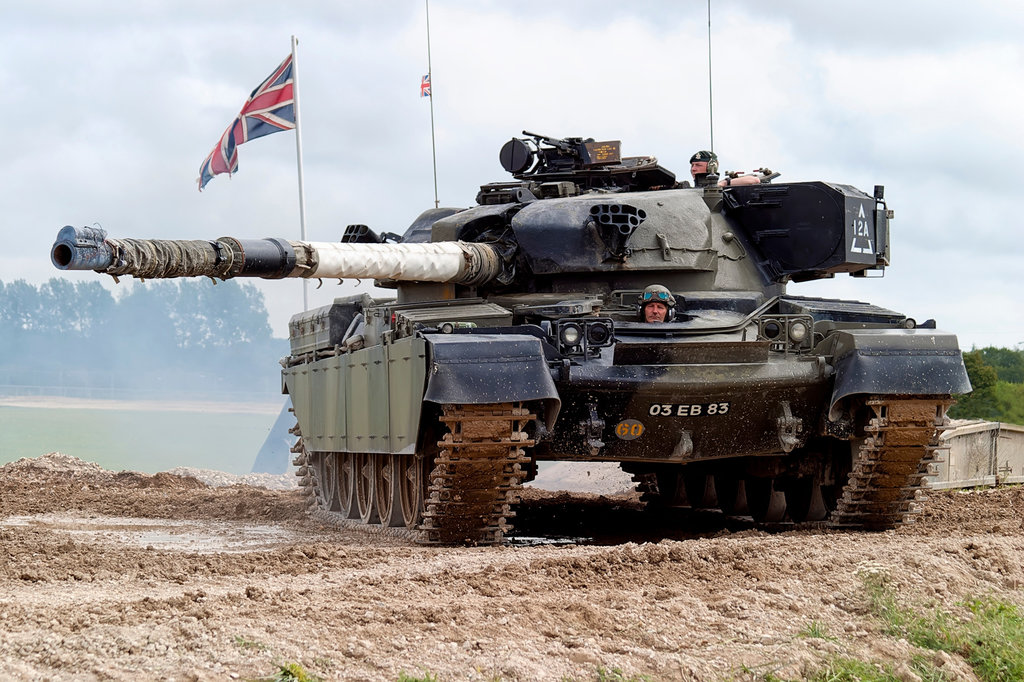Interview
In review of the UK’s IR Refresh
Following the 2022 Russian invasion of Ukraine, the UK moved to revisit the conclusions of its 2021 Integrated Review in its 2023 Refresh. Andrew Salerno-Garthwaite speaks with Lord Stirrup of the UK House of Lords’ International Relations and Defence Committee on the key challenges.

Lord Stirrup pays visit to Red Arrows in 2004. He was the Chief of the Air Staff (CAS) from 2003 to 2006 and then Chief of the Defence Staff until 2010 and took a seat in the House of Lords in 2011. Credit: In Pictures Ltd/Corbis via Getty Images.
On 13 March 2023 the UK Government published the Integrated Review (IR) Refresh, an update to the Integrated Review published in 2021 that was requested last year by then Prime Minister Liz Truss. The IR is a long-term strategy paper that sets out the ways the UK will protect its core national interests, in sovereignty, security, and the prosperity of the British people.
When the 2021 IR was last published, it, along with the accompanying Defence Command Paper, became the subject of a House of Lords (HoL) International Relations and Defence Committee (IRDC) inquiry. The resulting report, ‘UK defence policy: from aspiration to reality?’, catalogued a series of areas of concern that the committee felt were indeed of redress.
Global Defence Technology interviewed Lord Graham Stirrup, a member of the IRDC, a former senior Royal Air Force commander and Chief of the Defence Staff from 2006 until 2010, to ask how the committee felt the newly published IR Refresh had dealt with the areas of concern raised by the inquiry.
Determining a national strategy
One of the key issues the House of Lords’ IRDC was concerned about in the 2021 IR, in its original form, was how the UK positioned itself in relation to China. There had been a “strategic void” at the heart of UK foreign policy oaths subject.
However, had the Integrated Review Refresh, published in February 2023, made the distinction between calling China an ‘important partner’, as published in 2021, and calling China a ‘systemic competitor’ as the 2021 document had also done.
“Well, I think that it's substantially better than the predecessor version, one could still argue a bit about the order in which they put things and about some of the language. But understandably, in a government document, they've been perhaps a bit more restrained and diplomatic than one or two others might have been. But they have, it seems to me, adopted a much more coherent and robust approach to China, as we recommended in our report on the UK’s trade and security relationship with China,” said Lord Stirrup.
“They've made quite clear that there is a global contest going on for the nature of the future rules of the international order, which China is seeking to rewrite to suit itself, but which would not suit us. So, we have to contest that, and I think the Integrated Refresh has made that much clearer, much clearer about what China is seeking to do and what we should do in response.
“It's made clear that we need to improve our resilience dramatically, because China, if we are to contest it, will no doubt react, and sometimes react in an extremely difficult and unhelpful ways, and we have to be able to weather those kinds of storms. So, our national resilience is crucial in that regard, and the refresh makes that clear.
“It also makes clear that if we are to be successful in promoting our vision of what the future international order should look like, we cannot do so by ourselves, but will require the partnership of a great many other nations, particularly those in the Indo-Pacific area. It does acknowledge that and does talk about the need to develop those kinds of relationships. But what it doesn't do is necessarily go into the detail of how that is to be done and the resources that will be necessary to effect it.”

Credit: Andrew Harker / Shutterstock.com
Lord Stirrup touched on another are of concern that the 2021 document struggled to address: a lack of detail on international arrangements with partners, and a clear set of priorities between the Europe, the Indo-Pacific and other regions. The 2023 Refresh, according to Stirrup, is an improvement.
“I think it's much better, again, than its predecessor. The predecessor said that Russia was the most acute threat, but it really left it at that and then talked about the importance of a lot of other things. This time around, there can be no doubt, it has been very clear that the Euro-Atlantic area is an absolute top priority in security terms, and that that will require the great bulk of our military effort and investment.
“It then goes on to talk about China, rightly, but it does stress that although there will be some defence engagement, it's very much more of a political, diplomatic, economic, and technological challenge. So, I think in that sense, it's given a clear sense of priorities. Of course, once they start listing lots of other different areas of the world, it gets a little harder.
“I wouldn't say it's possible to sort out the fourth and fifth priorities, as it were, but at least one and two are pretty clear. I think the only comment I would make in that regard is that, yet again, as in the previous version, it has very little to say about the Middle East and the challenges there. That remains a crucial area for us and I think, in our view, still remains very much underplayed.”
The HoL committee, in its analysis of the preceding version of the 2021 IR had drawn attention to the lack of a well-defined policy to Taiwan.
“The piece on Taiwan is quite short and essentially says ‘our policy hasn't changed’. I can understand why the Integrated Review Refresh wouldn't go into great detail on Taiwan, but of course, it does remain the most dangerous issue in the near term in the Indo-Pacific. So, whatever the Integrated Review Refresh says, I would trust that the government is paying a great deal of attention to it,” said Lord Stirrup.
Funding for defence outlined in the Integrated Review Refresh
Speaking prior to the official announcement of an £11bn uptick in defence spending over a five-year period, Lord Stirrup outlined that the commitment in the IR Refresh to an additional £5bn in defence over two years, earmarked for the nuclear enterprise, was “incredibly important”.
However, what the UK MoD was seeking, according to Lord Stirrup, was funding to ensure that it could manage the inflationary and exchange rate pressures which were otherwise going to have a severe effect on the overall budget.
“So, my question remains, will this additional funding enable the Ministry of Defence to do that, or will we see cuts in other areas of capability? That remains an unanswered question. And if we are to see cuts in other areas of capability, then that will be a very serious concern. So that's my question about this short-term funding of £5 billion.
“In the longer term, though, it's quite clear that the cover for the inflationary pressures… only took the Ministry of Defence up to the next spending review. The amount of investment that was going to go into defence in future would be crucial to determining what it was able to do.
The Integrated Review is essentially saying that we face a more dangerous world than we've seen for many a year. And the Government's response to this is a vague aspiration to increase defence spending, at some point.
Lord Stirrup
“And, disappointingly, the Integrated Review has fallen rather dramatically on that. An effective strategy requires a sensible balance between ends, ways and means. In my view, the Integrated Review Refresh has done much better than its predecessor on ends and ways, but it fails signally on means. All it is giving is …a vague aspiration, at some indeterminate point in the future, to raise defence spending to 2.5% of GDP.”
Pointedly, Lord Stirrup stated that as recently as 2010 the UK was spending 2.6% on defence, which, given changes in defence budget accounting since that date and the increased loading of capabilities into the defence that otherwise sat outside, equated to a GDP spend of around 2.8% in today’s terms.
“So, the Integrated Review is essentially saying that we face a more dangerous world than we've seen for many a year. And the government's response to this is a vague aspiration to increase defence spending, at some point, to a level still below where it was in 2010. That, frankly, is not coherent. So that is the biggest and the critical weakness in the Integrated Review refresh.”
The Ministry of Defence as a ‘better customer’
With the UK Ministry of Defence expected to do more with less, greater emphasis will be placed on its ability to conduct a more coherent procurement policy, trying to avoid the significant delays and overspends that have become commonplace on defence acquisition programmes.
For Lord Stirrup, it was essential that there should be “more efficiency and less waste” in defence procurement, although such difficulties were also being felt by global peers.
“If you look around the world at equivalent militaries and the defence procurement, I don't think you'll find anyone that doesn't face very similar challenges. So, defence procurement in the round is an extraordinary difficult thing because you're dealing with cutting edge technology, you're dealing with a large amount of uncertainty.
As a nation we've never been poor at producing good ideas, but we've been pretty poor at turning them into commercial prospects or in defence terms, in the front-line capability.
Lord Stirrup
“As I say, that doesn't excuse from the need to get better at what they do. But our inquiry really focussed much more on the MoD’s ability to harness innovation and new technology and new thinking rapidly and turn that into frontline capability.”
Continuing, Lord Stirrup said, despite efforts by the Ministry of Defence, the UK has “been poor” at turning “good ideas” into commercial prospects or front-line capabilities. “We still have a problem, frankly, across government, across the public sector of being able to respond swiftly, to take appropriate levels of risk and manage that risk and to invest appropriately, to be able to turn good ideas that come from research and development into deliverable products.
“And the jury's still out on whether we can improve on that, but that will be a critical area going forward. But of course, a number of these issues that we’ve started to talk about now will be a subject for the Defence Command Paper refresh, rather than the Integrated Review Refresh.”